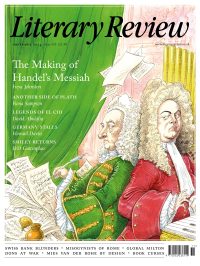Richard Smyth
Bard of Wormingford
Blythe Spirit: The Remarkable Life of Ronald Blythe
By Ian Collins
John Murray 416pp £25
It’s striking, if not startling, to be reminded that Ronald Blythe, the gifted, poised and complacent familiar spirit of the Essex–Suffolk border, was once a favourite of the New York Times, feted in print by John Updike, taken to dinner by Bergman and Bogarde. With his history The Age Of Illusion (1963) and his masterpiece Akenfield (1969), Blythe cracked America before reaching his half-century, with another half-century still to go (he was a hundred when he died in January 2023). Nevertheless, in this rich and enjoyable biography, Ian Collins is still able to assert, convincingly, that Blythe’s ‘own greatness as a writer was to come with great age’.
Blythe’s Word from Wormingford column in the Church Times – discursive, mild, enquiring, endlessly erudite, effortless (or apparently effortless) – began in 1993, when the writer was seventy and already comfortably ensconced on the spot where he was to die, Bottengoms, the crooked, dusty Essex house he inherited from his friends the artist John Nash and his wife, Christine. The publication in 2022 of Next to Nature, a collection of his Word from Wormingford work, was a suitable way for Blythe to mark his century, but as Blythe Spirit shows (a biography of this masterly writer surely deserves a better title) it would be a mistake to think that the mood of bucolic repose on display in the volume was characteristic of his career as a whole – or of Blythe the man.
Blythe was born in a pink-washed Suffolk longhouse in 1923 to a Londoner mother who adored the countryside and a taciturn countryman father, enduringly marked by the Gallipoli catastrophe (Collins more often than not settles on ‘gravedigger’ to characterise Blythe’s father, but that was only one of a number of

Sign Up to our newsletter
Receive free articles, highlights from the archive, news, details of prizes, and much more.@Lit_Review
Follow Literary Review on Twitter
Twitter Feed
Though Jean-Michel Basquiat was a sensation in his lifetime, it was thirty years after his death that one of his pieces fetched a record price of $110.5 million.
Stephen Smith explores the artist's starry afterlife.
Stephen Smith - Paint Fast, Die Young
Stephen Smith: Paint Fast, Die Young - Jean-Michel Basquiat: The Making of an Icon by Doug Woodham
literaryreview.co.uk
15th-century news transmission was a slow business, reliant on horses and ships. As the centuries passed, though, mass newspapers and faster transport sped things up.
John Adamson examines how this evolution changed Europe.
John Adamson - Hold the Front Page
John Adamson: Hold the Front Page - The Great Exchange: Making the News in Early Modern Europe by Joad Raymond Wren
literaryreview.co.uk
"Every page of "Killing the Dead" bursts with fresh insights and deliciously gory details. And, like all the best vampires, it’ll come back to haunt you long after you think you’re done."
✍️My review of John Blair's new book for @Lit_Review
Alexander Lee - Dead Men Walking
Alexander Lee: Dead Men Walking - Killing the Dead: Vampire Epidemics from Mesopotamia to the New World by John Blair
literaryreview.co.uk